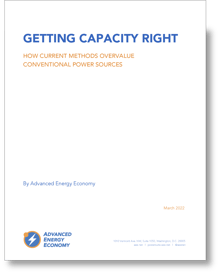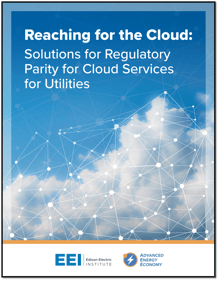Publish Date: March 30, 2022

Acceleration of the clean energy transition is dramatically shifting the types of electric generation technologies used to meet electricity demand and reliably operate the grid. Rapid cost declines in advanced energy technologies like wind, solar, and energy storage are making them increasingly competitive choices for new generation additions. While there has been considerable attention devoted to determining the reliability value of these new resource types, the methods used to evaluate the resource adequacy, or capacity value, of conventional thermal generating resources (including coal, natural gas, and oil-fired power plants) have not been formally reexamined or updated in decades.
View the Report
Topics:
Utility,
Regulatory,
Wholesale Markets
Publish Date: February 22, 2022
 Information technology (IT) and data solutions are a central focus of modern enterprise in every industry. Many industries have made the transition from traditional, on-premises IT solutions to cloud computing — and those industries have subsequently benefited from the scalability, flexibility, and efficient use of capacity cloud computing offers. However, regulations that have been in place for nearly a century have delayed the ability of utilities to transition from on-premises systems to cloud computing services. This paper, from AEE and the Edison Electric Institute (EEI), examines the regulatory reforms needed to modernize the IT systems that utilities depend on to provide safe, reliable, and efficient operations.
Information technology (IT) and data solutions are a central focus of modern enterprise in every industry. Many industries have made the transition from traditional, on-premises IT solutions to cloud computing — and those industries have subsequently benefited from the scalability, flexibility, and efficient use of capacity cloud computing offers. However, regulations that have been in place for nearly a century have delayed the ability of utilities to transition from on-premises systems to cloud computing services. This paper, from AEE and the Edison Electric Institute (EEI), examines the regulatory reforms needed to modernize the IT systems that utilities depend on to provide safe, reliable, and efficient operations.
View the Report
Topics:
Utility,
Regulatory
Publish Date: January 29, 2018
Throughout the economy, companies are finding efficiencies and operational benefits through services provided by third parties instead of physical assets that they own and manage.
However, under prevailing cost-of-service regulation, electric utilities may be discouraged from using such services, since they do not generate profits the way that investments in capital assets do.
View the Report
Topics:
PUCs,
Utility,
Regulatory
Publish Date: August 15, 2017
The U.S. utility sector has entered a period of foundational change, not seen since the restructuring of the late 1990s. Change is being driven by new technologies, evolving customer needs and desires, environmental imperatives and an increased focus on grid resiliency.
With these developments come challenges, but also new opportunities to create an energy system that meets the changing expectations of consumers and society for the coming decades. We call this the 21st Century Electricity System: a high-performing, customer-focused electricity system that is efficient, flexible, resilient, reliable, affordable, safe, secure and clean.
View the Report
Topics:
PUCs,
Regulatory
Publish Date: July 25, 2017
Voluntary renewable energy tariffs are quickly emerging as one of the key tools to meet growing corporate renewable energy demand in vertically integrated markets.
Participation in renewable energy tariffs has grown steadily over the past five years, and improvements in program design have continued apace. A report from Advanced Energy Economy Institute and a companion policy brief from AEE provide guidance for the design of successful renewable energy programs in regulated markets.
View the Report
Topics:
PUCs,
Utility,
Regulatory
Publish Date: May 31, 2017
Comments submitted by AEE Institute on behalf of AEE and its member companies in response to the Pennsylvania Utilities Commission's Tentative Order, issued on March 2, 2017, seeking input on alternative ratemaking methodologies.
View the Report
Topics:
State Policy,
PUCs,
Regulatory
Publish Date: May 19, 2017
Advanced Energy Economy Institute (AEE Institute) and Northeast Clean Energy Council (NECEC) shared comments they recently filed in support of Rhode Island’s Power Sector Transformation Initiative (PST). As requested by Governor Gina M. Raimondo on March 2, this comprehensive regulatory proceeding to modernize Rhode Island’s electric system is being conducted jointly by the Rhode Island Public Utilities Commission, the Office of Energy Resources, and the Division of Public Utilities and Carriers. AEE Institute and NECEC are partner organizations.
View the Report
Topics:
State Policy,
PUCs,
Regulatory
Publish Date: May 2, 2017
Comments submitted by AEE Institute on behalf of AEE and its member companies in response to the Illinois Commerce Commission's Resolution establishing the "NextGrid" initiative to "develop a shared base of information and work to build consensus on critical issues facing the electric utility industry."
View the Report
Topics:
State Policy,
PUCs,
Regulatory
Publish Date: March 28, 2017
Performance-based regulation (PBR) is a regulatory framework that attempts to align the behavior and financial interests of regulated utilities with public interest objectives and consumer benefits. It does so by rewarding utilities for achieving well-defined performance metrics (outputs), as opposed to providing incentives related primarily to capital investment (inputs).
View the Report
Topics:
PUCs,
Regulatory
Publish Date: February 14, 2017
Michigan faces challenges in the coming years, including a projected 2,000 megawatt (MW) increase summer peak demand in the Lower Peninsula from 2017-2026. In Michigan, as in many states, demand for electricity can spike during just a few hours a year.
Typically, 10 percent of our electric system capacity is built to meet demand in just 1 percent of hours during the year. This comes at a significant cost to consumers. Resource constraints in the Lower Peninsula are largely driven by weather, making peak demand events predictable — and therefore good candidates for management.
View the Report
Topics:
State Policy,
PUCs,
Regulatory

 Information technology (IT) and data solutions are a central focus of modern enterprise in every industry. Many industries have made the transition from traditional, on-premises IT solutions to cloud computing
Information technology (IT) and data solutions are a central focus of modern enterprise in every industry. Many industries have made the transition from traditional, on-premises IT solutions to cloud computing